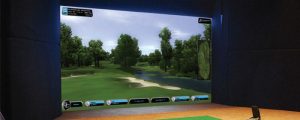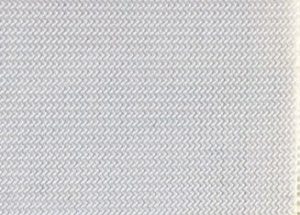 Jason Mills’ 1920-12 raschel knit fabric has found a niche in the golf simulator screen market.
Jason Mills’ 1920-12 raschel knit fabric has found a niche in the golf simulator screen market.
By Rachael S. Davis, Executive Editor
Milltown, N.J-based Jason Mills LLC is a manufacturer of nylon and polyester tricot and raschel knits as well as spacer mesh fabrics with a focus on industrial fabrics, specialty textiles and technical textiles. The company has more than 100 established stock keeping units, and frequently engineers and develops materials for specific customer needs.
Jason Mills offers one particular fabric in the recreational category — the 1920-12 — for the indoor golf simulator screen market. According to Michael Lavroff, president, this market has grown exponentially over the past three to five years as the use of the screens has expanded from public recreational facilities and sporting goods places to hotels and homes in a golf fanatic’s basement or garage.
There’s a lot of high-definition imagery and software involved with the simulator technology. Images are projected onto the fabric screen, and software calculates the distance of the ball and where it lands on the virtual fairway. The demands on the fabric used for the screen are significant — it needs to hold the image, drop the ball and not ricochet it back at the golfer, and also maintain its strength so the screen doesn’t break or tear as it takes repeated hits from the golf ball.
The market first emerged some eight to 10 years ago, and no one in the industry really knew what type of fabric would work best. Thoughts were that the screen should be firm because firmness equated with strength. However, firmer fabrics were loud when the ball hit and “the ball was coming back at the golfer like it had hit a trampoline,” Lavroff said. Companies also had trouble meeting the flame resistant (FR) requirements. Jason Mills’ solution at that time was a product named 1925-12 — a 12-gauge raschel knit made using a heavy 1,000 denier polyester yarn.
But as technology advanced in the simulator market with higher definition imagery and improved ball-tracking mechanisms, higher demands were placed on the fabric. Jason Mills, anticipating that the market would soon require a different fabric, created its 1920-12 style. The fabric currently is not branded, but the company is debating naming the product “Iron Impact.” Designed as an ultrastrong, single-layer application that can be used without a rear impact screen. the fabric carries same weight and safety features as the company’s original 1925-12 fabric, but is tightly knit using more needles per inch of fabric and a finer denier yarn. This construction compresses more yarn into the same area to give a really nice tight fabric that is a great receptor for high definition imagery, but still maintains the necessary strength, according to Lavroff. The fabric is dyed white, and treated with a FR finish that passes the NFPA 701 large scale testing requirements.

raschel knit fabric
One significant differentiator that sets Jason Mills apart from the competition in this market is the ability to offer wider-width products. “All of our fabrics for the golf screen end use are a minimum of 120 inches wide” Lavroff said. “Most of our competitors can only go 60 inches wide and then the fabric has to be seamed together. Our wider width fabric avoids the need for a seam across the center of the finished screen.”
The company also has several other products in development for the screen market. One is a spacer mesh with a tricot knit face and back. The cushioning between the two layers deadens the sound and adds extra protection. The second new style is a 28-gauge raschel product that Lavroff thinks may be the most successful material for the market yet.
Each golf simulator company has its own set of requirements and there is not a one-size-fits-all product for the market. “This industry is so vast, and the magic fabric for one company, is not the product another guy is looking for,” said Lavroff. “But that points to an industry that is growing, and the key here is to become the company that can provide the product lines that most end users are looking for. We want to be the company to come to.”
For more information about Jason Mills’ 1920-12 raschel knit fabric, please contact
info@jasonmills.com
January/February 2019




